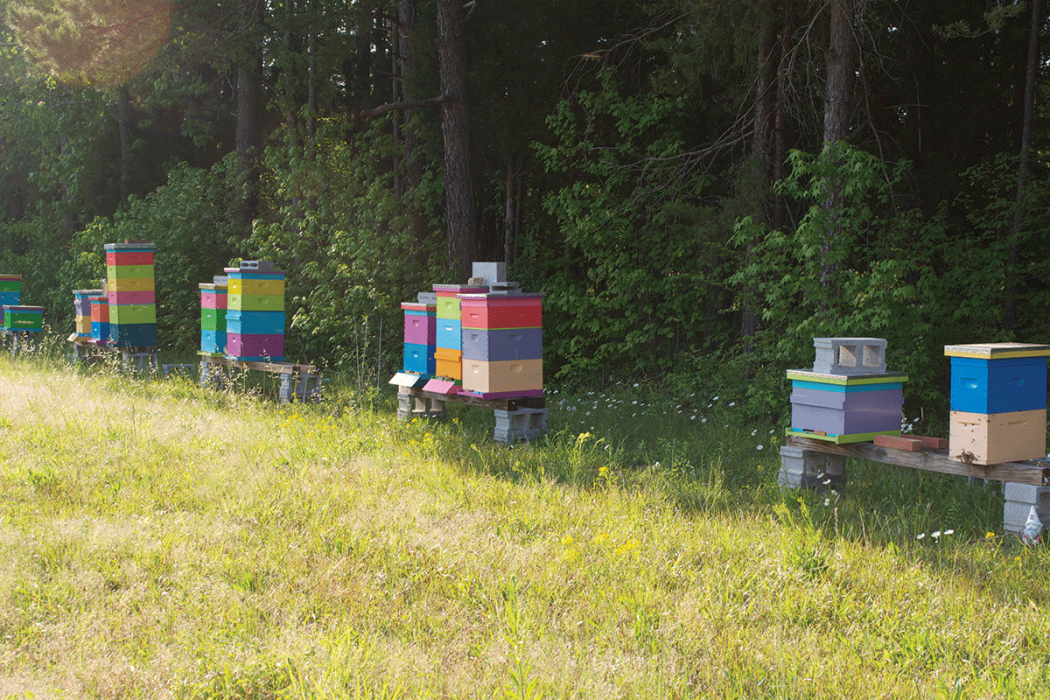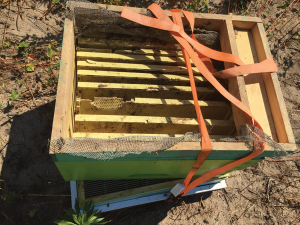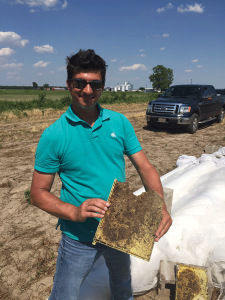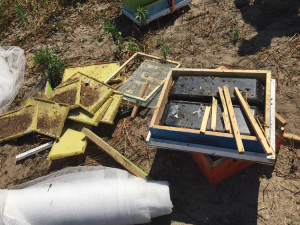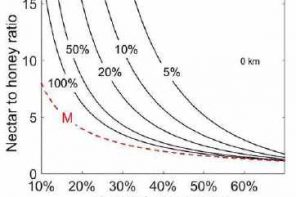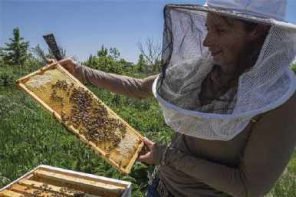Not Beary Friendly
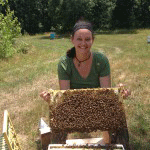 By: Jessica Louque
By: Jessica Louque
It’s a pretty well known fact that I don’t have a lot of fondness for wildlife. Sure, at a distance, nature in general is pretty cool, but I’d prefer if a little more of that nature stayed away from the house. There have been been several battles with raccoons, opossums (does anyone else leave the “o” off that word and think it looks normal?), snakes, deer, coyotes, hawks, owls, foxes, and the occasional feral cat colonizing our trash bags. This year, I had the great fortune to add another creature to the “List o’ Anger” due to destruction: BEARS!
We moved a couple hundred hives to the coastal region of NC, and a few people warned that there were bears in the area and in the Fall they would likely be a little aggressive. If we were keeping bees there, it would probably be a good idea to put up bear fences. Not exactly scoffing at the idea, we decided we would just leave the hives for now and move them out of the area once the seasons started changing. Boy, was that a naïve and stupid idea.
We had about 14 different leases for land across the area, and were trying to put the hives in places with pretty decent vehicle access. Initially, we moved the hives on a semi, unloaded them in a trucker-friendly driveway area, and then dispersed to deliver the hives. Most of our apiary sites were within a mile or two of each other, with the farthest being about 10 miles away. We didn’t have stands out yet for the bees, so the intent was to drop them off, open up the screens, and then go back in a couple days and set them off the ground a bit. We didn’t want the cat-rats (raccoons and skunks) tearing into the hives or flooding to ruin them.
Keep in mind, at this point in time we are yet again waging war against the local raccoon mobsters. Even with the chickens safely tucked away in their pen, some choose to sleep outside the coop. It’s still a pen with two feet of buried wire, a locking door, and a hawk net, so it’s fairly safe from predators if we remember to shut the door at night. If it’s nice weather though, we still sleep with the window open to be able to hear what’s happening. One night recent to these events, I was woken up to the sound of our half-grown chickens screaming. Running outside in boots and pajamas with my current favorite pest gun (a Browning 1911-.22, not too heavy to aim while the target is running away), I see a raccoon nimbly run-crawling across the hawk net away from me. I have also invested in a very cool but previously mocked article of outdoor wear: the toboggan headlamp. Those LED lights are amazing and I find it to be incredibly useful if I run in the morning and it’s not daylight yet. It also makes raccoon spotting much easier than having to hold a flashlight and a gun. It turns out that he has now murdered six of our black hen babies (two dark Cornish, a Minorca, two black giants, a black turken) and he broke the neck of my new baby turken rooster who seemed to be trying to protect the black turken hen when the raccoon attempted to pull him through the hawk net and broke his neck. Raccoons are not stupid, I’ll give them that. He chewed right through the net in a way that would leave an easier escape route. I hate raccoons. The point is, I was already on an anti-predator rampage.
Back to our bee story – we have a tech team who was going out to check the hives and give status updates on the colonies and their survival of the moving. We received some unexpected news that some of our hives had been completely vandalized by bears. The screened bottom boards suffered the worst of the damage, and were thrown upside down and had the mesh peeled back like a banana. There were bite marks in the frames bigger than my hand and those sections were stripped clean of everything. No wax, no brood, no bees. All of them had on robbing screens and most of those were shredded in an attempt to get inside the solid bottomed hives. It was some definite bee carnage.
The locals were all very stern in their advice that we needed to move the hives out of that site immediately and put up bear fencing around all of our other bees because the bears would be back and all our sites were fairly close. We started gathering supplies and in the meantime one of our landowners, who is a hobbyist beekeeper, lost all of his hives to a bear while ours sat in the field mere yards away from his. This site suddenly became the highest on the priority list. Some other feedback came in the form of not shooting the “favorite” bears. Scott, a cool guy who owns probably the best hardware (and literally everything else) store I’ve ever been in, showed me pictures of the mama bear and her triplet yearling cubs that he was particularly fond of (especially the chocolate colored one). The chocolate bear was in a picture eating a barrel of peanut butter set out as a bear “trap crop” because it’s only about $50/barrel at the peanut factory in Edenton, and “oh-my-gosh” bears are super cute eating peanut butter. I think the trap was to get adorable photos of bears eating peanut butter. Not that I wasn’t still angry, but it was pretty darn cute. His tongue was even hanging out, flapping in the peanut covered air. They could make peanut butter and honey sandwiches out of our bee frames! Wait, no – bad idea!
Scott’s information was useful in the fact that he did not want us to shoot one of the bears he liked (let’s be honest, revenge hunting is a pretty common practice in the Louque family), but he is a really nice person too and helped us out by working with Stan, another of our cooperators, to build a bear fence at one of our sites and show our tech team how to do it in the most effective way possible. The trick was to have five wires, with every other wire live (the second and fourth were grounded). This way you have a warning if you hit a live wire, but if you touch two of them, you’re going to get thrown like a bad rodeo clown. We had our teams assembling fences for three days straight and managed not to lose any more hives to bears. Stan had a corn plot near one of our fences, and a large chunk of it was demolished by what looked like a bear trying to make crop circles while drunk. I’m not really sure what it was trying to accomplish in its little bear-like mind, but I have to say I’m glad it was the corn and not our bees (sorry Stan!).
Bobby and I learned two very important things from this. One is that when locals tell you that bears will probably be an issue at some point, it’s better to be preventative than to have to treat the problem – just like it’s better to keep yourself healthy then to try to make it better after you’ve already went to crap.
The second thing was how to build an effective electric fence around our chicken coop that should fry a raccoon and throw him like a skeet across a field. Preferably landing from said flight in a crispy critter nugget, sizzling on the ground like a raccoon meteor. Bobby took about a day and assembled a mini fence that the kids could step over (since George is only nine he’s not quite tall enough to clear it easily and it might be best described as hurling himself across) and the birds could get through, but when it was turned on at night would not allow anything that was less than three feet off the ground to cross. So far it’s been fairly successful, and I’m hoping to use the trail cam to catch something trying it out and hopefully seeing them get thrown into fried raccoon oblivion. Maybe they’re smarter than I think though, because I haven’t had any evidence as of yet (no burnt nuggets of raccoon fur or anything) that something wants to test the wire.
Hopefully our bear woes have come to an end with our beloved bees. It seems that we have successfully thwarted attempts to make our hives a buffet for the local bears, but I’ve heard some horror stories of bears overcoming a fence just by sheer strength. If we end up losing this battle again, rest assured that you’ll be reading a follow-up article that includes a recipe for a delicious bear steak. We might be participating in bear season this year anyway just to shut down a little of the extremely overzealous population in the East. For now, the bears and our bees are safe and sound sharing space across the countryside, and can hopefully stay that way with the assistance of high-voltage interference in the relationship.
Jessica Louque and her family are keeping bees, farming, gardening and living off the land in North Carolina.







